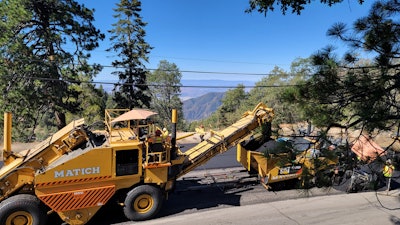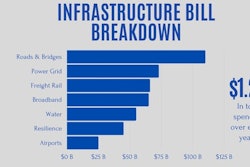
The bipartisan infrastructure bill unveiled this week is riding a wave of momentum, but it will soon face the tough job of selling it to skeptical Republican senators. Not only are they worried about how much it will add to the federal deficit, there are also a slew of amendments, 281 to be exact, that need to be settled before a vote can take place.
The U.S. Senate is expected to pass the sweeping Infrastructure Investment & Jobs Act (IIJA) this week. According to The Hill, the timing will depend on whether Republican senators, in particular, feel they’ve been given enough chance to make changes to the legislation. Nearly half of the $1 trillion measure would be allocated to federal highway, bridge and public transportation improvements. In addition to a $370 billion, five-year reauthorization of the surface transportation programs, the package includes $86 billion in supplemental resources for these programs.
If passed, the legislation would mark a huge political win for President Biden, who campaigned on restoring bipartisanship to Washington. Whether the legislation passes the Senate rests largely on the internal political dynamics of the Senate GOP conference however. GOP leaders say a lot will depend on the Congressional Budget Office's (CBO) assessment of the legislation.
Right now, Republican leadership predicts the bill's revenue provisions will cover a little more than half the cost of the overall bill when the CBO's cautious standards for assessing legislation are applied.
Their estimates of the budgetary costs and benefits of various components of the infrastructure plan, with its $550 billion in new spending, have been a crucial part of negotiations; they’ll examine trillions of spending in the mammoth reconciliation bill to follow and their work may help decide which Congress members are on board.
Last week, lawmakers were touting $522 billion in “pay-fors,” including $205 billion in repurposing existing COVID-19 relief funds and a White House estimate of $50 billion from recouping fraudulently collected supplemental unemployment benefits over the past year, a provision that has already drawn some skepticism. Lawmakers cited a previous CBO analysis that estimated $56 billion in new revenue generated over a decade by economic growth spurred by the improved infrastructure
Congress will require this mark up in hand later before any vote would occur.
Senators' budget wariness is a reversal in Republican policy direction that should be significant for infrastructure stakeholders. These are mostly the same senators who failed to advance infrastructure legislation in the preceding four years, but added $2.3 trillion to federal debt before the start of the COVID crisis with 2017's Tax Cuts and Jobs Act alone. Figures issued by the bipartisan Committee for a Responsible Federal Budget measure Trump's Senate-facilitated policy actions inflated national debt by a total of $3.9 trillion before COVID.
Compromise is Key
Meanwhile, lawmakers are haggling over more than 250 proposed amendments to the legislation. So far, the Senate has considered eight amendments to the plan. The upper chamber is poised to consider another "substantial tranche" of amendments today though an agreement on the total number of amendments to weigh has not yet been reached.
It's unclear when the amendment process will close, but Republicans are urging the process to not be rushed as it may risk losing their support, which requires 60 votes. Ultimately, the Senate is not expected to adopt any amendments that substantively change the bill and risk the fragile agreement negotiated by the bipartisan group of 22 senators falling apart.
A major sticking point in the legislation is the use of "green energy." Republicans have introduced a number of amendments to the package aimed at defending or promoting the use of fossil fuels.
The bill also includes language requiring a study on any job losses or impacts on energy costs stemming from President Joe Biden’s decision to cancel a permit for the Keystone XL pipeline. An amendment from Sen. Marsha Blackburn, R-TN, would require Biden to reverse that cancellation if the study finds it resulted in job losses and impacts on consumer energy costs.
The bill already includes language requiring a study on the “cradle to grave environmental impact” of electric vehicles but Sen. Joni Ernst, R-IA, wants tighter language and has an amendment to require a study on the “emissions of the full lifecycle of an electric vehicle, from battery production to disposal.” The amendment would further spell out what the study should examine.
Midwestern ethanol supporters have expressed concern about a lack of support for biofuels in the infrastructure bill. One of Ernst’s amendments would authorize $1.5 billion for a grant program to install ethanol blender pumps infrastructure.
One amendment we're glad to see is introduced by Sen Tim Kaine, (D-VA) which proposed adding language prioritizing fixing existing highways before building new capacity. The approach was one embraced in a surface transportation bill passed by the House on July 1.
The package would authorize the largest amount of funding for surface transportation programs, according to a summary provided by Democrats on the Environment and Public Works Committee but transportation experts say the funding is just a fraction of what is needed to address the nation’s backlog of needed repairs, with the latest estimate from the American Society of Civil Engineers estimating a $786 billion backlog for roads and bridges alone.
Once all amendments have been passed, the bill then heads to the House. It is not yet determined if the chamber will make changes to the measure and send it back or try and pass the package in its current version.




















